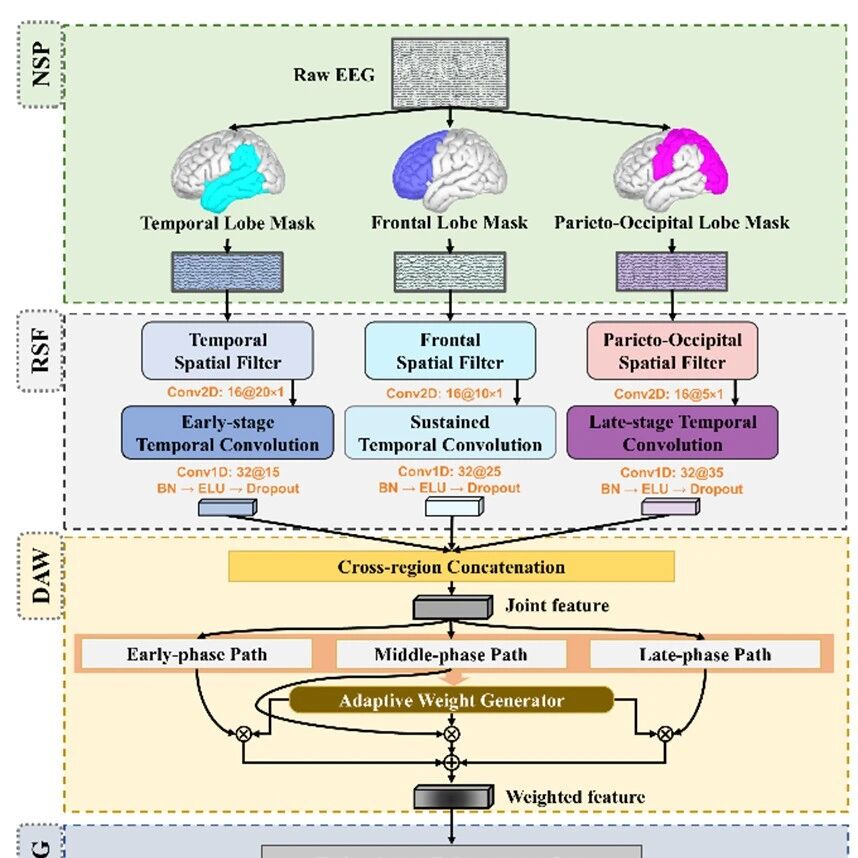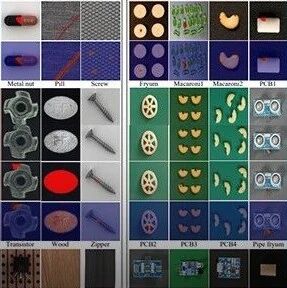
点击蓝字 关注我们

欢迎各位专家学者在公众号平台报道最新研究工作,荐稿请联系小编Robert(微信ID:BrainX007);或将稿件发送至lgl010@vip.163.com。
英文标题:An integrated portable bio-monitoring system based on tough hydrogels for comprehensive detection of physiological activities

成果简介
先进软离子导电水凝胶因其高灵敏度、感知特性、可调导电性及可拉伸性,在集成式便携健康监测设备领域发展迅猛,可用于生理活动监测与个人健康检测。然而传统水凝胶导体通常易受大变形和强机械应力影响,导致实际应用场景中机电稳定性欠佳。
本文通过共价交联与离子交联网络的协同调控,结合盐析效应,设计出强离子导电水凝胶(聚乙烯醇-硼酸-甘油/海藻酸钠-氯化钙/电解质离子,简称PBG/SC/EI),显著提升了水凝胶的机械强度与离子导电性。得益于能量耗散机制与盐析效应的协同作用,该PBG/SC/EI材料展现出卓越的结构完整性与鲁棒性,具备出色的力学性能(断裂伸长率559.1%,抗拉强度869.4 kPa)及高离子电导率(1.618 S·m⁻¹)。因此,该PBG/SC/EI应变传感器具有高灵敏度(GF=2.29),可有效监测多种人体运动(关节运动、面部微表情、微弱呼吸及语音识别)。与此同时,基于水凝胶的Zn||MnO₂电池展现出高达267.2 mAh·g⁻¹的比容量和356.8 Wh·kg⁻¹的最大能量密度,并具备优异的循环性能——经8000次循环后仍保持71.8%的容量保持率。此外,集成传感器与Zn||MnO₂电池的生物监测系统能够以实时、无创的方式精确识别多种生理活动。本研究为设计高性能导电水凝胶提供了可行策略,可用于构建具有卓越实用性的高可靠性集成生物监测系统。
研究亮点
提出了一种双重交联(共价+离子)并引入盐析效应的强韧离子导电水凝胶(PBG/SC/EI)。结合了PVA-硼酸-甘油共价网络与海藻酸钠-钙离子离子网络,并通过浸泡ZnSO₄/MnSO₄溶液进一步增强机械性能与离子电导率。
将应变传感器与Zn||MnO₂电池集成,构建了一个柔性、便携、自供电的生物监测系统。系统可实时、无创地监测多种生理活动(如关节弯曲、面部表情、呼吸、步行等),并具备多通道信号识别能力(如手势识别)。
图文解析

Figure 1. Concept demonstration of the flexible bio-monitoring system. The schematic diagram of the anion and cation transport in the PBG/SC/EI hydrogel (top left), schematic diagram of the flexible bio-monitoring system (bottom left), and the system detecting physiological activities of the human body (right).

Figure 2. (a) Synthetic procedure of the PBG/SC/EI hydrogel and molecular structure of PBG/SC. (b) SEM image of the freeze-dried PBG/SC/EI and corresponding mapping images for Mn, O, S, Zn, and Ca elements. (c) FTIR spectra of the freeze-driedPBG/S, PBG/SC, and PBG/SC/EI. (d) Tensile stress-strain curve of PBG/SC/EI. (e) Tensile stress-strain curves at 50% strain of PBG/SC/EI for the cyclic loading-unloading mechanical tests. (f) Stress-strain curves under different strains of PBG/SC/EI for loading-unloading mechanical tests. (g) Ten successive loading-unloading cycles at 30% strain of PBG/SC/EI. (h) The calculated ionic conductivity of PBG/EI,PBG/SA/EI,and PBG/SC/EI.

Figure 3. Electromechanical properties of the PBG/SC/EI hydrogel strain sensor. (a) The sensing mechanism of the strain sensor based on the prepared hydrogel. (b) Relative resistance-strain response curves of the strain sensor. (c) A cycle of strain from 0% to 100% and then back to 0%, held for 10 s at different strains. ((d) and (e)) Resistance response of repeated stretching tests of the strain sensor at different strains. (f) Cyclic stretching-releasing under 25% strain at 60 mm min-1 for 100 cycles (the insets show the enlarged plots for 5-15,45-55, and 85-95 cycles).

Figure 4. Electrochemical performance of the flexible Zn||MnO2 battery. (a) Schematic illustration of the flexible Zn||MnO2, battery with the PBG/SC/EI hydrogel electrolyte. (b) CV profiles measured at various scan rates. (c) The b values obtained from the slopes of log(i) vs. log(v) plots. (d) CV curves with capacitive contributions at 0.2 and 2.0 mVs-1. (e) Normalized capacitive and diffusion contributions at various scan rates. (f) Rate capability and Coulombic efficiency. (g) The durability of the flexible Zn||MnO2 battery. (h) EIS plot (the insets show the equivalent circuit and resistance values). (i) Photographs of a multimeter powered by the Zn||MnO2 battery under different bending angles. (j) Photographs of a timer powered by the Zn||MnO2 battery.

Figure 5. Applications of the flexible bio-monitoring system. (a) Circuit diagram of the test system. (b) Optical photos of the flexible bio-monitoring system attached to the human body. The time-current response curves in response to different movements of (c) elbow bending, (d) wrist bending, (e) and (f) knee bending, and (g) finger bending. (h) Optical photo of the hydrogel-based strain sensors connected with the fingers of a rubber glove. (i) The time-current response curves for different gestures. The time-current response curves in response to different movements from (j) walking, (k) cheek bulging, (l) frowning, and (m) breathing.

Figure 6. Sensing applications of the flexible bio-monitoring system in vocalization. Sensing of subtle muscle movements of the throat when the same person says the words (a)“battery”, (b)“energy”, (c)“sensor”, and (d)“hydrogel”.
研究结论
本文通过构建双交联PVA/SA网络并利用盐析效应,成功合成了新型PBG/SC/EI离子导电水凝胶,进一步提升了该水凝胶材料的力学性能。由于其独特的结构优势,该PBG/SC/EI水凝胶实现了增强的机械性能(抗拉强度869.4 kPa,断裂伸长率559.1%)和高离子电导率(1.618 S/m)。由此获得的韧性水凝胶传感器具有出色的机械耐久性、高灵敏度和宽检测范围,能够准确、快速地识别和响应人体的各种动作。同时,采用PBG/SC/EI水凝胶电解质的柔性Zn||MnO2电池在0.1 A·g-1条件下展现出267.2 mA·hg-1的高容量,经8000次连续循环后仍保持71.8%的优异容量保持率。更重要的是,采用PBG/SC/EI传感器和Zn||MnO2电池构建的柔性生物监测系统,实现了对肢体动作、面部微表情和发声等人体动作的实时精准检测。这项工作为柔性集成生物监测系统中离子传导水凝胶的合理设计提供了新见解,该系统具有高灵敏度和超稳定性。
免责声明:原创仅代表原创编译,水平有限,仅供学术交流,如有侵权,请联系删除,文献解读如有疏漏之处,我们深表歉意。


公众号丨智能传感与脑机接口











